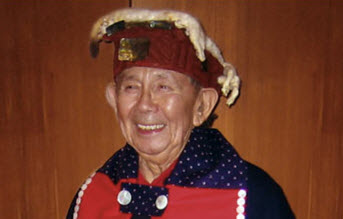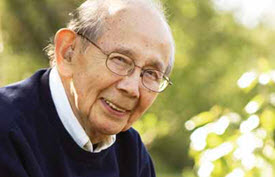Available as a podcast!
Fifty years ago, on September 13, 1971, Alfred Scow, hereditary chief of the Kwicksutaineuk First Nation on Gilford Island, was appointed a judge of the BC Provincial Court. He brought a unique combination of determination, diligence, integrity, diplomacy, altruism, patience, humility, humour, and dignity to the Court and to his ground-breaking work for Indigenous peoples and the wider community.
The Honourable Alfred Scow, OB, OBC, was the first Indigenous person to graduate from law school in BC and the first Indigenous lawyer to be called to the BC Bar, as well as the first Indigenous BC Provincial Court judge.

Born in Alert Bay on April 10, 1927, he was the eldest child of Chief William and Alice Scow. His father was a self-educated engineer who served as a provincial magistrate. Both parents believed strongly in formal education. As a child, Alfred attended St. Michael’s Indian Residential School and then public schools in Richmond and Vancouver, before taking three years of undergraduate Arts and obtaining a law degree at the University of British Columbia. Having begun commercial fishing with his father at the age of six, he financed his university education by working on halibut and salmon boats.
Alfred Scow was 34 when he graduated from the UBC law school in 1961. In 2005 he told the UBC Law Alumni Magazine, “It was a real struggle for me to get through law school”. However, he said his timing proved perfect. “If I had graduated before 1961,” he explained, “I could not be called to the bar, because Aboriginal people in Canada were not citizens.”
His work as a lawyer included successfully defending a woman charged with murder early in his career, after the client insisted he represent her rather than bring in a senior lawyer. He also served as the first full-time prosecutor for New Westminster.
His life took an unusual turn when he got a call from Ottawa in 1967. As he described it to the UBC Law Alumni Magazine, the caller said, “We have been led to believe you would be interested in [an] assignment to Guyana on the Amerindian Lands Commission, and I said, ‘You have been very badly misinformed.’” But through several more phone calls and some library research with his wife, Joan, he learned that “48 percent of the population were Indians from India and 38 percent were black, five percent were Amerindians, and the rest were a mixture of Chinese, Portuguese, English, Scots and American. I said, ‘There’s one good thing: for the first time, I’ll be in the majority!’”
He spent two years on the Amerindian Lands Commission’s fact-finding committee in Guyana to help determine land policy regarding Indigenous populations, and on his return became Chair of the BC Workers’ Compensation Review Board. Then, on September 13, 1971, “I took my dog sailing in English Bay,” he told the magazine. “We came home and … my wife leaned out the back window and said, ‘Hi, Judge!’ I thought she was kidding around. ‘No,’ she said, ‘I heard it on the radio.’”
Judge Scow served on the Court for 21 years. A wise and compassionate judge, he was viewed with great affection by court staff, lawyers, other judges, and many of the people who appeared before him. During his time on the bench, he prompted his fellow judges to set up bursaries for Indigenous students at BC law schools that continue today.
Marion Buller, the first female Indigenous judge in British Columbia and chief commissioner for the National Inquiry into Missing and Murdered Indigenous Women and Girls, said, "I recall from my time as a lawyer that Judge Scow treated everyone with kindness and respect. It didn’t matter who you were - bound by addiction, poverty, trauma, fear - you were treated the same way. This was important because so many of the people who appeared in front of him didn’t experience much respect or kindness in their lives. But Alf was no pushover! He knew the law. He knew people. What a perfect combination to have in a judge!"
Retired judge Ray Low added, “I remember appearing before Judge Scow as a lawyer on the Court’s Northern Circuit between Stuart and Atlin in the early 1990s. I recall him as quiet, friendly, determined, and fair, while conducting an orderly courtroom - despite sitting in poorly heated, badly furnished, acoustically bereft, crowded rooms where the first appearance list was long. Many files had been adjourned from the Court’s previous sitting some two months previously and not a few of the litigants and witnesses present, with little means, had journeyed long and difficult ways to get to court with high hopes their case would finally be heard. He dealt admirably with those challenges.”

After retiring from the Court in 1992, Alfred Scow volunteered with a wide array of Indigenous and community groups. At UBC alone, he served on the Alumni Association board, the President's Advisory Committee, the Senate, the Faculty of Law First Nations Advisory Committee, and was a founding member of the Elders Committee for the First Nations House of Learning. Outside the university, he also volunteered as a board member for the Aboriginal Justice Centre, Pacific Salmon Foundation, John Howard Society, United Good Neighbour Fund and Credit Union, BC Lions Society for Children with Disabilities, YVR Art Foundation, and the Institute of Indigenous Government.
In 2001, he founded The Scow Institute for Communicating Information on Aboriginal Issues, dedicated to providing accessible, non-partisan, fact-based information to improve understanding between Indigenous and non-Indigenous people about issues affecting Canadians.
Judge Tina Dion worked with him to build the institute and help achieve its goals, beginning when she was a law student in 1995. “Judge Scow hoped to help non-Indigenous Canadians understand the history behind some of the legal issues affecting Indigenous peoples – issues like land rights, matrimonial property rights, and the limitations imposed by federal jurisdiction on reserve land. The Institute published papers on these topics, and others including taxation of indigenous people, their rights to natural resources and fish, and Indigenous women’s and Métis' rights.”
Judge Dion eventually became the president of the Institute. Judge Anja Brown also later joined the board. “The Institute, like Alfred, started from modest, humble beginnings”, Judge Dion said. “Everyone chipped in $100 to buy paper, stamps, and a fax machine, and we worked on weekends and evenings to draft papers and raise funds. The Scow Institute reflected Alfred’s vision and his lifetime of work trying to bridge the gap between Indigenous and non-Indigenous people to create a better Canada.” She added, “I was very fortunate to have worked with Judge Scow for many years. Even in his retirement, he worked tirelessly to make our society a better, more inclusive place for all of us.”
In 2009 he collaborated with author Andrea Spaulding and illustrator Darlene Gait on Secret of the Dance, a picture book that described a 1930s Potlatch in Kingcome Inlet.
Alfred Scow died on February 26, 2013. His inspiring leadership in breaking barriers for Indigenous people and his contributions benefitting all Canadians were recognized when he was awarded an honourary Doctor of Laws degree from the Allard School of Law in 1997, the Order of Canada in 2000, and the Order of BC in 2004.
On the 50th anniversary of his appointment to the Provincial Court Judge Karen Whonnock reflected on his legacy, saying, “The Honourable Alfred Scow was an inspiration, not only to me, but to Indigenous law students, lawyers and judges across Canada. As a residential school survivor, he never let that stop his pursuit of his goals. Once in a while, a leader comes along and fearlessly blazes a new path. Judge Scow opened up new pathways for thousands to follow after him. His positive impacts are still being felt as now more Indigenous people are called to the bar and appointed to the bench across Canada. He exemplifies the best qualities of a hereditary chief and Indigenous leader.”
Sources for this article include:
Profile of Alfred J. Scow, UBC Law Alumni Magazine, Summer 2005
BC Judge Alfred Scow remembered as “aboriginal pioneer”, Georgia Straight, March 8, 2013
Law Society saddened by death of retired Provincial Court Judge Alfred Scow
Order of BC 2004 recipient Alfred Scow
Photo credits: https://www.scowinstitute.ca/aboutalfred.html and https://historyproject.allard.ubc.ca/law-history-project/profile/honourable-alfred-j-scow-oc-obc

